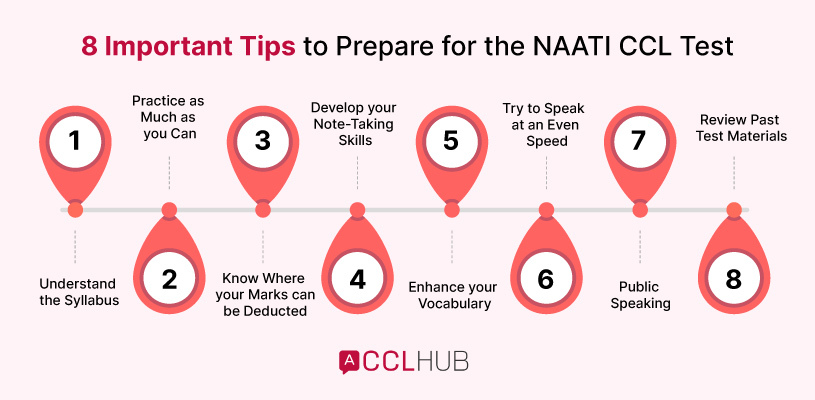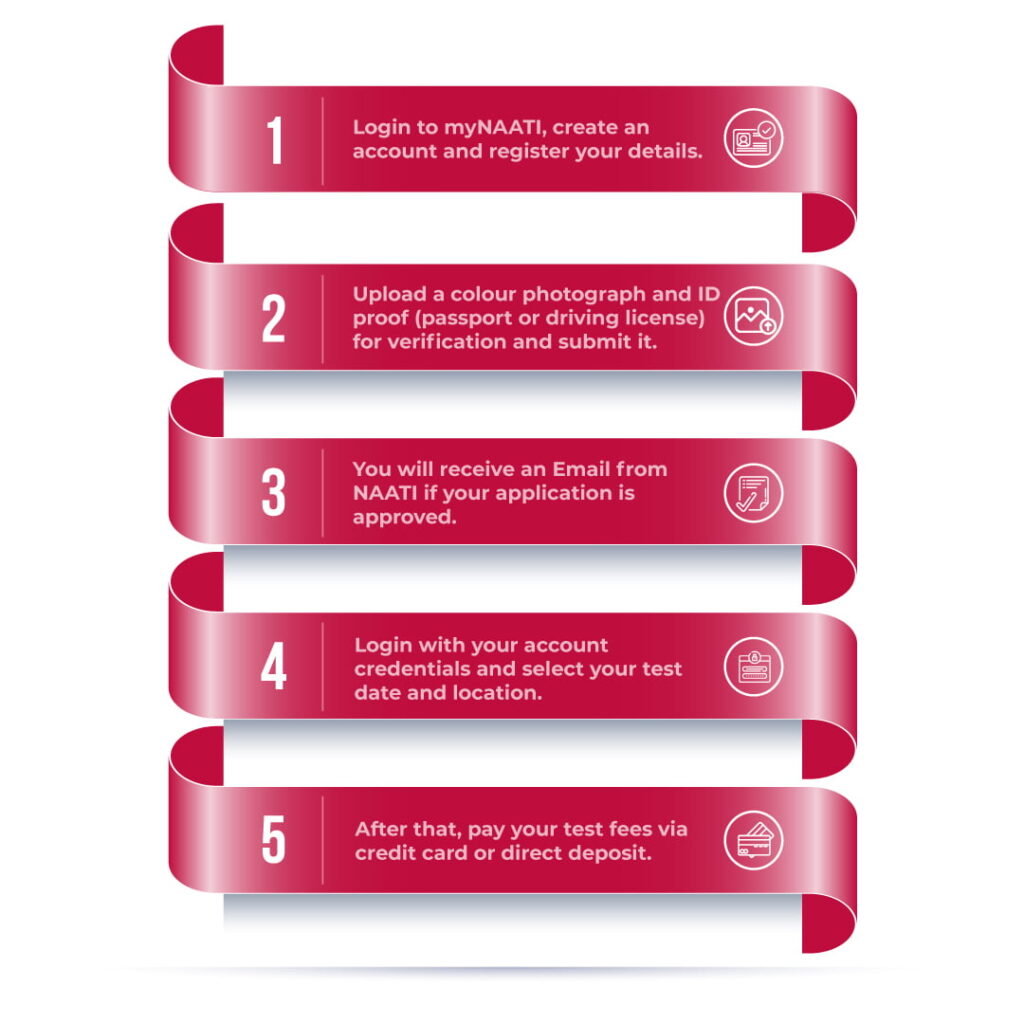
An Overview of NAATI CCL Test
NAATI (National Accreditation Authority for Translators and Interpreters) is a non-profit organization operated jointly by the Commonwealth, the state, and the territory government. This blog will provide information about an overview of the NAATI CCL test.
Likewise, NAATI CCL is a test, especially for translators and interpreters in Australia; it is a national standard and certifying authority. The NAATI CCL Test is a verbal test that verifies the ability of an applicant to translate the dialogue between LOTE (language other than English) to English and vice versa.
Besides, applicants looking to apply for a point-based visa usually take the CCL exam, and applicants are awarded five bonus points upon completing the test.
These bonus points are often referred to as Community Language Points. Also, this test is not a professional certification, and you cannot directly start working as an interpreter or a translator if you pass the CCL test.
However, suppose you acquire the NAATI CCL certification. In that case, you will be awarded five Australian PR points and have a high chance of securing your career in a linguistic or interpretation field.
Let’s explore more about the NAATI CCL test.
What is the NAATI CCL Test?
The NAATI CCL Test is a NAATI evaluation in which, after the test completion, the applicant has the right to demand five points for their PR in Australia and add them to their point collection.
For starters, the exam will consist of two sets of dialogues required by the applicant to be translated into English and LOTE.
To attempt and pass the examination successfully, a test applicant should know the test’s format and NAATI CCL test sample components. Also, since the test is not written and is carried out orally, it is more important to know the components and eligibility criteria of the NAATI CCL test.
If you follow the right course curriculums and tips before attempting the test, the NAATI CCL test is easy to pass. For the exam, the section is split evenly for both languages. The NAATI CCL test criteria represent the objectives of both languages in the same way.
Moreover, you can certainly pass the NAATI CCL test, but the candidates should plan accordingly. Applicants can select the LOTE (Languages Other Than English) for the exam.
The NAATI CCL exam has given about 48 languages to choose from. There are even more new languages coming up for the exam. For test preparation, you must select one LOTE in which you are confident and fluent in vocabulary.
🔔 Don’t Miss: Assessment Criteria of the NAATI CCL Exam.
How is the NAATI CCL Test Assessed?
NAATI CCL Test is assessed by a minimum of two NAATI examiner, who evaluates the candidate’s ability to communicate effectively in English and LOTE.
Moreover, the following are six significant factors that contribute to the NAATI CCL test assessment.
1. Language Proficiency
Your language proficiency in English and your native language is a fundamental aspect of the NAATI CCL test. Proficiency implies the ability to communicate effectively and a deep understanding of the language’s structure, vocabulary, and nuances.
Similarly, In this test, you must demonstrate your fluency and competence in both languages, as it forms the foundation for accurate translation and interpretation.
2. Cultural Understanding
Cultural understanding is pivotal for the accuracy and relevance of your translations and interpretations. It involves grasping the cultural subtleties and context that often underlie language use.
Also, this understanding helps you convey not just words but also the intended meaning within the cultural framework. It is obvious to consider the cultural context when interpreting or translating to ensure your work is culturally sensitive and appropriate.
3. Translation Accuracy
The NAATI CCL test places a high emphasis on the accuracy of your translations. This means your rendering of text from one language to another should be precise to retain the original meaning in the interpretation without distortion.
Even minor errors in grammar, vocabulary, or meaning can have a significant impact on the assessment.
Hence, strong attention to detail and a strong command of the languages in question are vital to excel in this aspect.
4. Language Register
Language register involves adapting your language to different contexts, such as formal or informal situations. It is a critical aspect of language use that relates to adjusting your communication style according to the formality and context of the situation.
In the NAATI CCL test, you must be able to switch between registers appropriately, depending on the given scenario. Meanwhile, maintaining the correct tone and formality level shows that your interpretation or translation aligns with the context and audience’s expectations.
5. Ethical Considerations
Upholding ethical standards is a very crucial thing throughout the NAATI CCL test. This includes maintaining confidentiality, avoiding biases, and ensuring impartiality in your work.
Moreover, ethical considerations are essential to maintain trust and integrity in the field of translation and interpretation.
6. Language Quality
The quality of language use extends beyond mere proficiency. It encompasses your ability to use language effectively, employing the right words, sentence structures, and expressions to convey meaning accurately.
Additionally, high language quality demonstrates your linguistic competence and enhances the clarity and precision of your translations and interpretations.
NAATI CCL Test Format
In the NAATI CCL test, each dialogue has three parts: the introduction, the main conversation, and the wrap-up. In the introduction, you’ll hear a brief description of the situation and the people involved. This part helps you understand the context.
The main conversation is where the bulk of the test happens. You’ll listen to a recorded conversation between two speakers, one speaking English and the other in your native language.
Similarly, your task is to interpret what they say accurately. This means you need to convey the meaning in the other language while maintaining the tone and style of the original conversation.
After the main conversation, there’s a wrap-up where you summarize what was discussed. You don’t need to interpret this part; just summarize the key points concisely.
Here’s a tip: The dialogues cover different topics like healthcare, education, or legal matters. To do well in the test, being familiar with these subjects in both languages is important.
Likewise, In the test, you’ll have headphones to listen to the dialogues and speak your interpretations into a microphone.
Let’s explore more NAATI CCL test facts you need to know.
Topics Covered
During the NAATI CCL Test, you will have a real-life scenario dialogue to translate. In Australian society, these dialogues used will represent real-life circumstances.
Furthermore, they assess candidates’ ability to understand and communicate in both languages. The dialogues can include the following topics:
| Business | Community Affairs | Employment |
| Health | Immigration/Settlement | Legal |
| Community | Education | Financial |
| Housing | Insurance | Social Services |
8 Important Tips to Prepare for the NAATI CCL Test

Up to this point, you might have gotten the idea about NAATI CCL, its marking, and many more about NAATI CCL Test. But you might be worried about the preparation.
Don’t worry. I have a perfect solution for this, too. To get an overview and proper tips to prepare for the NAATI CCL Test, you need to:
1. Understand the Syllabus
The first thing to do to prepare for the NAATI CCL exam is to understand the latest syllabus and exam pattern set by the official NAATI.
For this, you must understand that the full mark is 90, and you must get 63 to pass the examination. Each of the 45 marks has two dialogue sets, and you need to get at least 29 in each to pass.
Also, It is built on a method of deductive marking, so any errors you create will result in negative marking.
2. Practice as Much as you Can
Practice is indeed the key to success in the NAATI CCL test. The only way to score good marks in exams is to practice more and make yourself comfortable for the exam.
It is obvious that practice is the primary key to passing any exam. But, to excel in the NAATI CCL test, you must also understand the real-time exam scenario.
Moreover, the more you practice, the more comfortable you become with the exam format and the more proficiency you acquire to pass the NAATI CCL Test. It helps you get used to the real-time nature of the test and boosts your confidence.
3. Know Where your Marks can be Deducted
As the overall performance of NAATI is measured using a deductive marking system, you should always be aware of what answer you give. It would be best to always carefully deliver the dialogue, as omitting or adding both can deduct your marks.
In the context of a dialogue set, there should be no distortion. You should aim to speak without delays, hesitation, or frequent self-correction.
Also, these are the areas where your marks can be deducted, even if your vocabulary is fine. Hence, you have to be careful in every aspect of preparation.
4. Develop your Note-Taking Skills
In the NAATI CCL test, you will only get 2-3 seconds before you can give your answer. Hence, it’s better to take notes of important keywords in each sentence to make it easier for you to give answers.
Furthermore, by listening to audio clips from TV, radio, news, or YouTube, you can practice this and take notes to assist you in the test. Also, during the practice phase, it is easier to create your abbreviation, saving you time in the actual exam.
5. Enhance your Vocabulary
Vocabulary is the most crucial part of the NAATI CCL Test, and you must improve your vocabulary to translate the dialogue without omission. You can accomplish this by learning a lot of dialogue sets and knowing Australia’s socio-cultural scenarios.
Also, conversations in various fields, such as legal, health, culture, immigration, settlement, education, social services, finance, industry, insurance, consumer relations, etc., will help you gain more vocabulary knowledge.
6. Try to Speak at an Even Speed
Practice speaking at an even speed without pauses or hesitations. Speaking too fast or too slow may lead the examiner to need help understanding your translation.
Moreover, If the examiner doesn’t understand your translation, it may lead to a negative marking.
7. Public speaking
The applicant must interpret the dialogue immediately after listening to the audio file. Also, one needs to improve public speaking skills to preserve the concept of normal and in-flow.
If you do this, It will allow you to prevent lengthy delays, hesitation, and frequent self-correction. Also, It helps you build up your trust and language delivery skills to assess NAATI CCL.
8. Review Past Test Materials
If available, reviewing past NAATI CCL test materials can be immensely beneficial. It allows you to become familiar with the types of dialogues and topics that are commonly covered in the test.
This helps you anticipate what to expect, which can reduce anxiety on the exam day. While the specific dialogues may vary, there are often recurring themes and scenarios.
Moreover, practicing with past materials can give you a better sense of what you’ll encounter during the test day, allowing you to prepare more effectively.
NAATI CCL Test: 5 Reasons for Marks Deduction
In the NAATI CCL test, marks can be deducted for several reasons.
These deductions may occur if you need to accurately interpret or translate the content, make significant errors in language usage, retain the context of the conversation, or omit important details during your interpretation. By working on the following five reasons for mark deduction, you can clear the NAATI CCL exam in under one week.
1. Accuracy (Correctness of Information)
Accuracy is one of the most critical aspects of the NAATI CCL test. It means getting things right and ensuring the information you convey is correct. You’re interpreting or translating from one language to another in this test.
If you make mistakes and convey wrong information, it can lead to deductions in your marks.
You need to understand what’s being said in both languages to avoid accuracy errors.
However, It’s not just about knowing the words; it’s about grasping the meaning and making sure it’s the same in both languages. Practicing and improving your language skills will help you understand your interpretations and translations more accurately.
2. Distortions (Misrepresentations of Information)
Distortions refer to when you change or twist the meaning of information during interpretation or translation. For example, if someone in the conversation says, “I’m happy,” but you interpret it as “I’m sad,” that’s a distortion. You’ve changed the meaning from positive to negative.
Moreover, distortion can confuse the listener or reader, which is the biggest downfall to your interpretation or translation.
However, to avoid distortions, focusing on conveying the original meaning as faithfully as possible is essential. Remember, the goal is to accurately represent the information without distortions or alterations.
3. Omission (Removal of Information)
Omission means leaving out important information when you’re interpreting or translating. It’s like reading a book and skipping a whole chapter.
Similarly, omitting crucial details in the NAATI CCL test will undoubtedly lead to deductions in your marks.
Hence, it’s crucial to be attentive and capture all the essential information in the dialogue to avoid omissions. Try to understand the conversation and provide an accurate interpretation or translation without missing anything important.
4. Insertions (Addition of Information)
Insertions happen when you add extra information that wasn’t originally in the conversation when you’re interpreting or translating. Making such unnecessary insertions can lead to deductions in your marks.
If you want to avoid insertions, it’s crucial to stick to what’s said in the conversation and not add anything extra. Your job is to convey the original meaning faithfully through interpretation.
But, if you want to be more precise in your interpretation, practicing your listening skills can help you avoid adding unnecessary information.
5. Ethical Breaches
Ethical breaches refer to actions or behaviors that violate ethical standards, like a set of moral and professional rules guiding appropriate conduct.
In the NAATI CCL test, these breaches can result in deductions from your score, impacting your overall performance.
One key ethical principle is confidentiality. You must never disclose personal or confidential details shared during the conversation.
Furthermore, your role as an interpreter or translator is to facilitate communication, not to reveal private information.
Another vital principle is avoiding bias. Bias entails favoring one side of a conversation over the other or letting personal opinions sway your interpretation. In the NAATI CCL test, you’re expected to remain neutral and unbiased.
Hence, to steer clear of ethical breaches during the NAATI CCL test, it’s crucial to remember your role as a professional language facilitator. You are responsible for enabling communication between individuals speaking different languages, not expressing your views, revealing confidential information, or showing favoritism.
How is the NAATI CCL Test Marked?
The NAATI CCL Test consists of 2 dialogues of 45 marks each. These dialogues consist of approximately 300 words, half in English and the remaining in LOTE.
It is a must for you to learn about the marking criteria of the NAATI CCL test. Another important thing to remember is you must score at least 29 marks in each dialogue and an overall score of 63 to pass the NAATI CCL test.
The result for the NAATI CCL Test is given as follows:
- Pass: 63 or higher (marks out of 90)
- Marginal Fail: between 58 and 62.5 (marks out of 90)
- Clear Fail: less than 58 (marks out of 90)
As for the result, it will be sent to the test candidates via email. You will get the result within 4 to 6 weeks of the test date, and the NAATI CCL test result will be valid for three years from the date of certification.
Moreover, due to the statistical improbability of the result being overturned, the candidates with CLEAR FAIL results cannot apply for a review of their test.
✅ Check Out: How to Access Free NAATI CCL Test Samples?
CCLHUB for NAATI CCL Test
CCLHUB, a NAATI CCL preparation portal, is an Australian-based organization that helps NAATI CCL Test applicants with preparation courses. We have a 100% pass record.
CCLHUB also provides various course materials according to your preparation level and will guide you along your preparation journey at your own pace.
Furthermore, CCLHUB provides NAATI CCL course materials, intensive coaching classes, NAATI CCL mock tests, and free NAATI CCL test samples, which will help you pass the NAATI CCL test on your first attempt.
Courses offered by CCLHUB:
- Self Preparatory Course
- Mock test
- Unlimited course
- Recent Exam Dialogues and Vocabs
Once you get any of these courses, our team of experts will help you easily ace the NAATI CCL Test.
How to Book the NAATI CCL Test?
The following figure details how you can book the NAATI CCL test.

Minimum Technology Requirements for the NAATI CCL Test
As the NAATI CCL Test is made online, you must meet certain criteria before appearing for the test. Previously, the test was in the NAATI office, where the candidate would be physically present without any technology requirement.
However, candidates must take their exams from home after the pandemic. So, minimum technology is required to sit for the test.
1. Internet Connection
The recommended Internet speed is 1.2 Mbps for peer-to-peer HD video quality with HD 720p resolution at 30fps. Before the exam, we strongly advise you to check your speed well.
Also, your test will be recorded. You must also remember that because of test protection criteria, NAATI doesn’t allow using a personal hotspot connection from your cell phone.
2. Device Requirements
To take the NAATI CCL Test, you’ll need a computer or laptop. It’s like the brain of your setup. Make sure it’s updated and works smoothly. Also, remember to connect to the internet.
Furthermore, your computer has an operating system (OS), like Windows or macOS. Check if it’s one of those or similar ones. And make sure it’s up-to-date, like having the latest software updates.
Plus, you’ll need a webcam and microphone because sometimes you’ll speak during the test. Make sure they’re working fine.
3. Web Browser
When you take the NAATI CCL Test, you’ll use this window to visit the test website. Common web browsers include Google Chrome, Mozilla Firefox, or Microsoft Edge.
Ensure you have one of these installed on your computer, and keep it updated.
Using the web browser is easy. It’s like clicking on a link to enter a virtual place. When you’re ready to take the test, you’ll click on a link provided by NAATI, which will open in your web browser.
Updated browsers work better and faster, which is essential for stability when you’re taking a test online. So, remember to keep that internet window (your web browser) up to date, and you’ll be all set for the NAATI CCL Test.
4. Headset
During your exam, you are expected to use a headset, which may be normal cell phone earphones or headphones in the style of a dedicated video conference. I do not suggest using Bluetooth or wireless headsets because of potential communication problems during research.
Before the exam, please ensure your headset is working. Because of audio problems, separate and built-in speakers are not permitted.
5. Adjust your Volume
You’ll want to ensure you can hear everything clearly during the test. To do this, find the volume control on your computer. You can also find sound settings in your computer’s control panel.
This is important because you must hear spoken prompts or questions during the test.
Also, the key is to find the right volume level. You don’t want it too high, as it could be too loud and distracting. On the other hand, if it’s too low, you might struggle to hear what’s being said during the test.
Likewise, before you begin the actual NAATI CCL Test, there’s often a practice section. During this time, you can check if your volume is set correctly. This way, you’ll be well-prepared for the real test.
🔔 Also, check out: Benefits of one-on-one online classes for NAATI CCL
Conclusion
In conclusion, the NAATI CCL Test is a significant opportunity for individuals looking to enhance their linguistic career and immigration prospects in Australia. Moreover, this test is a gateway to various career opportunities and offers the advantage of earning five Australian PR points.
Throughout this overview, we’ve explored critical aspects of the NAATI CCL Test, including its purpose, format, and scoring. We’ve also discussed the importance of language proficiency and cultural understanding in this test and the benefits it offers in terms of career growth and immigration.
Hence, by understanding its requirements and preparing effectively, you can excel in both careers and immigration aspirations.
Happy learning!!
FAQ
Q.1: How can I book the NAATI CCL Test?
You can book the test through the official NAATI website or CCLHUB. Just follow their instructions, and you’ll be good to go.
Q.2: What languages are available for the CCL Test?
NAATI offers CCL Test in various languages. You can find the full list on their website. Common languages like Mandarin, Hindi, Punjabi, and more are included.
Q.3: How long is the NAATI CCL Test?
The test takes around 20-30 minutes. It includes dialogues in English and your chosen language, and you need to translate them.
Q.4: What’s the passing score for the CCL Test?
You need to score at least 29 out of 45 marks to pass. It’s like getting more than half the answers right.
Q.5. How can I prepare for the NAATI CCL Test?
You can prepare by practicing sample tests, improving your language skills, and understanding the NAATI guidelines. Online resources and courses from CCLHUB can help, too.
Q.6: What are the benefits of passing the CCL Test?
Passing the CCL Test can help you in your career by opening up opportunities in translation and interpreting. It also gives you five PR points if you’re planning to migrate to Australia, which can be a big advantage.



